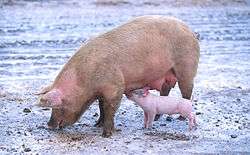porcus
Latin

porcus fēmina et porculus (a female pig and piglet)
Etymology
From Proto-Italic *porkos, from Proto-Indo-European *pórḱos (“young swine, young pig”). Cognate with Old English fearh (“young pig, hog”). More at farrow. Compare also Ancient Greek πόρκος (pórkos).
Pronunciation
- (Classical) IPA(key): /ˈpor.kus/, [ˈpɔr.kʊs]
Audio (Classical) (file)
Noun
porcus m (genitive porcī); second declension
Usage notes
- For the semantic shift of “pig” to “female genitalia”, compare the same Ancient Greek use of χοῖρος (khoîros).
Declension
Second-declension noun.
| Case | Singular | Plural |
|---|---|---|
| Nominative | porcus | porcī |
| Genitive | porcī | porcōrum |
| Dative | porcō | porcīs |
| Accusative | porcum | porcōs |
| Ablative | porcō | porcīs |
| Vocative | porce | porcī |
Synonyms
- (pig): sūs
- (battle formation): caput porcī
Derived terms
Descendants
- Corsican: porcu
- Gallurese: porcu
- Dalmatian: puarc
- Eastern Romance:
- Emilian: pôrch, pōrc
- Italian: porco
- Ligurian: pòrco
- Neapolitan: puorco
- Old French: porc
- Old Leonese: [Term?]
- Asturian: puercu
- Mirandese: puorco
- Old Occitan: porc, puerc, puerch
- Old Portuguese: porco
- Old Spanish: [Term?]
- Spanish: puerco
- Rhaeto-Romance:
- Sardinian: porcu, polcu, procu
- Sassarese: porcu
- Sicilian: porcu, poccu
- Venetian: porco
- → Alemannic German: Porgge
References
- porcus in Charlton T. Lewis and Charles Short (1879) A Latin Dictionary, Oxford: Clarendon Press
- porcus in Charlton T. Lewis (1891) An Elementary Latin Dictionary, New York: Harper & Brothers
- porcus in Charles du Fresne du Cange’s Glossarium Mediæ et Infimæ Latinitatis (augmented edition, 1883–1887)
- porcus in Gaffiot, Félix (1934) Dictionnaire Illustré Latin-Français, Hachette
Anagrams
This article is issued from
Wiktionary.
The text is licensed under Creative
Commons - Attribution - Sharealike.
Additional terms may apply for the media files.